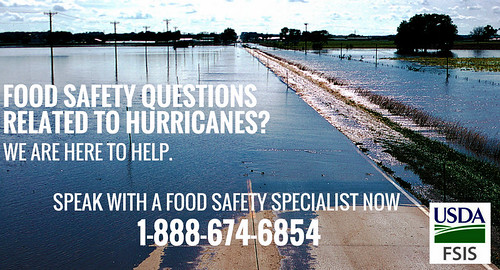
The last severe weeks have shown how devastating natural disaster can be. In Texas and Louisiana, hundreds of thousands of people were left without electricity and billions of dollars of property damage was sustained from Hurricane Harvey. Shortly after, Hurricane Irma became one of the strongest hurricanes ever, barreling through the Caribbean and southeastern U.S. In light of these recent disasters, it’s important to remember there are simple steps you can take to minimize food loss and reduce your risk of foodborne illness during and after severe weather and power outages.
It seems simple, but a lot of planning goes into being prepared. As we recognize National Preparedness Month this September, set a goal to prepare your family and even your community for when disaster may strike. If your power goes out due to storms and high winds, how do you know if the food in your refrigerator is safe? Something as small as that can be a challenge and a waste of hundreds of dollars in food, if you aren’t prepared. Here are some tips for disaster preparation:
- Keep an appliance thermometer in the refrigerator and freezer. It will indicate the temperature in the refrigerator and freezer in case of a power outage. Make sure the refrigerator is at 40°F or below and the freezer at 0°F or below. Keeping food cold after the power is out is important. Freeze containers with water and put ice in the refrigerator, freezer and coolers. You can purchase or make ice cubes and store in the freezer for a later use in the cooler or the refrigerator.
- If you know in advance the power may go out, refrigerated items such as leftovers, milk, and fresh meat and poultry should be stored in the freezer to keep them at a safe temperature longer. The refrigerator will keep food cold for about four hours if it stays unopened. A full freezer will hold the temperature for approximately 48 hours and for 24 hours if it is half full and the door remains closed.
- Plan ahead and know where to buy dry ice and block ice. Dry ice and block ice will keep the refrigerator and freezer cold if the power is out for a prolonged period of time.
Keeping your food safe during a natural disaster or a power outage is important to minimize food waste and reduce the risk of foodborne illness. Discard refrigerated perishable food such as meat, poultry, fish, soft cheeses, milk, eggs, leftovers and deli items if the power has been out for more than four hours or the temperature inside your refrigerator or cooler is above 40°F.
FSIS’ YouTube video “Food Safety During Power Outages” has instructions for keeping frozen and refrigerated food safe. The publication “A Consumer’s Guide to Food Safety: Severe Storms and Hurricanes” can be downloaded and printed for reference during a power outage. An infographic is also available outline steps you can take before, during and after severe weather, power outages and flooding. FSIS provides relevant food safety information during disasters on Twitter @USDAFoodSafety and Facebook.
Consumers with questions about food safety related to power outages, or any other food safety question, can call the USDA Meat and Poultry Hotline at 1-888-MPHotline (1-888-674-6854) or chat live with a food safety specialist at AskKaren.gov, available from 10 a.m. to 6 p.m. Eastern Time, Monday through Friday, in English or Spanish.


